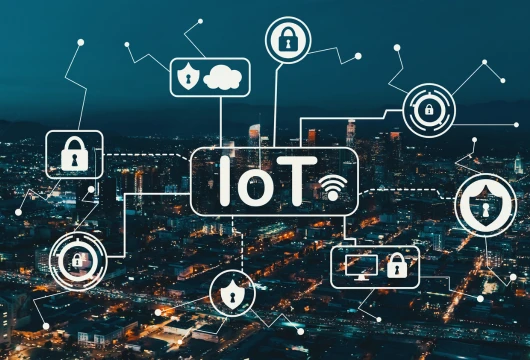Harnessing IoT to Drive Green Innovation and Efficiency
The intersection of the Internet of Things (IoT) and sustainability is transforming businesses worldwide, and India is no exception. With industries increasingly seeking energy efficiency, waste reduction, and carbon footprint minimization, IoT-driven solutions are game changers. By embedding smart sensors, AI-driven analytics, and real-time data tracking, businesses can optimize resource utilization while ensuring compliance with environmental regulations.
From innovative manufacturing to intelligent waste management, here are 10 ways Indian businesses leverage IoT to drive sustainability.
1. Smart Manufacturing and Industry 4.0
India’s manufacturing sector is significantly shifting, integrating IoT, AI, and data analytics to enhance efficiency and minimize environmental impact. IoT-powered predictive maintenance reduces downtime and prevents excessive energy use, while real-time machinery monitoring ensures optimized operations. The government’s Production Linked Incentive (PLI) scheme also incentivizes tech-driven sustainable manufacturing.
Example:
Smart factories in the automobile and electronics sectors now use IoT-enabled automation, which results in 20-30% energy savings and reduced material waste.
2. Sustainable Building Management
IoT-powered building automation systems are making Indian real estate smarter and greener. These systems monitor energy consumption, water usage, and air quality in real-time, enabling data-driven decision-making for sustainability.
Example:
Facilio, an Indian startup, offers cloud-based IoT solutions for building management. These allow real estate owners to reduce electricity and water wastage while improving energy efficiency.
3. Smart Energy Grids & Renewable Integration
With India’s ambitious National Green Hydrogen Mission and increasing focus on renewable energy, IoT plays a pivotal role in innovative grid management. IoT-enabled grids help integrate solar, wind, and hydro energy sources efficiently, ensuring reliable and low-carbon electricity distribution.
Example:
Several Indian utilities are integrating IoT-based smart meters to track energy consumption patterns, enabling dynamic demand-response mechanisms that reduce electricity wastage.
4. IoT-Enabled Sustainable Agriculture
Agriculture is one of India’s largest consumers of natural resources. IoT is helping optimize irrigation, reduce pesticide use, and increase crop yield by providing farmers with real-time soil and weather data.
Example:
Precision farming startups like Unlimit (backed by Reliance ADA Group) provide IoT solutions that monitor soil moisture levels, reducing excessive water use while maximizing crop productivity.
5. Water Conservation & Smart Water Management
Water scarcity is a pressing issue in India. IoT-powered solutions are being implemented to track water usage, detect leaks, and optimize water distribution networks.
Example:
Several Indian municipalities and industrial zones are deploying IoT-based water meters that send real-time alerts on leakages and unauthorized usage, significantly reducing water wastage.
6. Intelligent Waste Management Systems
India generates millions of tons of waste annually. IoT-driven waste management solutions help track waste collection, segregation, and recycling processes to improve efficiency and reduce landfill burden.
Example:
Several smart cities in India have implemented sensor-based garbage bins that notify waste collection units when full, reducing fuel consumption and optimizing collection schedules.
7. Smart Logistics & Sustainable Supply Chains
Supply chains contribute heavily to carbon emissions. IoT solutions enable route optimization, fleet tracking, and fuel efficiency in logistics.
Example:
IoT-powered cold chain monitoring systems are helping reduce food spoilage and wastage in India’s agriculture and pharma sectors, ensuring better resource utilization and lower emissions.
8. IoT in Healthcare & Environmental Monitoring
Indian businesses use IoT to monitor air and water pollution, track carbon emissions, and provide real-time alerts on hazardous environmental changes.
Example:
TerraBlue XT, an Indian startup, is pioneering IoT-based health solutions that support environmental tracking and ensure businesses maintain a sustainable operational footprint.
9. Eco-Friendly Public Transport & Smart Cities
Indian cities are integrating IoT-enabled smart transport solutions to reduce congestion, minimize fuel consumption, and promote electric vehicles (EVs).
Example:
Intelligent traffic systems powered by IoT in cities like Bangalore and Pune are helping reduce carbon emissions by optimizing signal timings and vehicle movement.
10. IoT for Carbon Footprint Tracking
Many Indian companies are deploying IoT solutions to measure and reduce their carbon footprint, ensuring compliance with ESG (Environmental, Social, and Governance) goals.
Example:
Large conglomerates and green startups use IoT sensors to monitor real-time emissions, helping them make data-driven sustainability decisions.
IoT is revolutionizing sustainability across Indian businesses, industries, and public sectors. From manufacturing and agriculture to waste management and smart cities, IoT drives efficiency, reduces resource consumption, and supports India’s green transition goals.
By leveraging IoT for sustainability, India is paving the way for a cleaner, more efficient, and climate-resilient future.
For more inspiring Blogs, click here.

